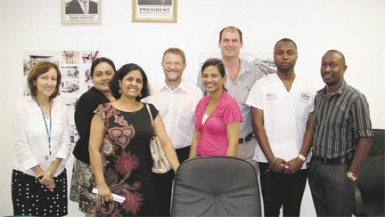A team from the French Guiana Health Council was recently in Guyana seeking this country’s participation in an HIV co-infection research on histoplasmosis.
Histoplasmosis is a fungal infection. People with compromised immune systems as with HIV patients are particularly vulnerable.
The French Guiana team comprised General Director of the Health Regional Agency, Philippe Damie and researchers, Prof Mathieu Nacher and Dr Antoine Adenis.

They visited Guyana last month. They met with officials of the Pan Caribbean Partnership for HIV/AIDS (PANCAP) including, Director Juliette Bynoe-Sutherland, and the Guyana National AIDS Programme Secretariat (NAPS) led by Dr Shanti Singh, to share information on the HIV co-infection project.
They were also seeking to convince NAPS and the National reference laboratory, to be part of the regional research project which includes French Guiana, the state of Amapa, Brazil, Suriname and is intended to include Trinidad and Tobago, a release from the Caricom Secretariat said.
The project aims to evaluate the prevalence of disseminated histoplasmosis by measuring fungal antigens in serum and urine of HIV infected patients. The infection forms a deadly combination with HIV.
Histoplasmosis is a serious public health issue that is relatively unknown in the region.
It poses a threat for People Living with HIV/AIDS (PLWH). Disseminated his-toplasmosis often mimics tuberculosis which can lead to false “drug-resistant tuberculosis”.
The release said that many deaths could be avoided through early detection and treatment.
However, diagnosis is difficult because medical mycology is one of the least developed areas of laboratory practice. A new test, a Histoplasma ELISA Antigen detection test, recently developed by the US-based Centers for Disease Control, (CDC), has proven to be an important step towards improving diagnosis and reducing mortality.
The INSERM (French National Medical Research Institute) led research project will last for 36 months and the expected outcome will be increased awareness of the burden of histoplasmosis and the availability of an affordable, sensitive, rapid technique to diagnose one of the most likely causes of AIDS-related deaths in South and Central America, the release said. CDC will pass on the technique to each country, the release added.
Damie in describing the initiative stated that “we share the same HIV problem on the Guiana shield, and it is thus important for the French Health Regional Agency to develop collaborations with neighbouring countries.”
He added that the “The Guianas working together on common health problems simply makes perfect sense.”




